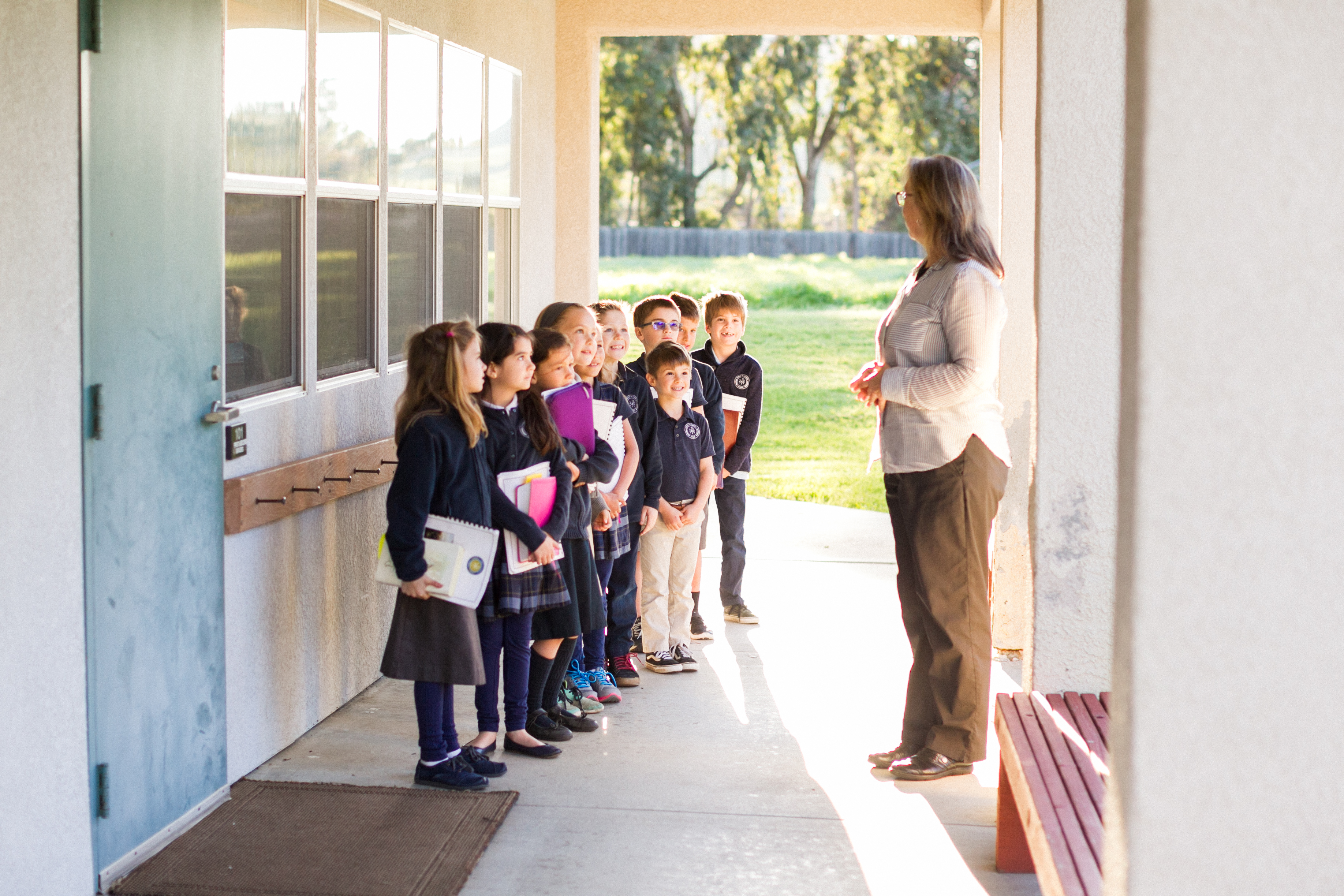Distinctives
Christ-Centered Culture
Classical Methodology
Curriculum
- School of Grammar (K through 6th): language proficiency (reading, grammar, and spelling), handwriting, history, Bible, mathematics, and Latin. To supplement these important subjects are science, music, art, drama, and physical education.
- School of Logic (7th through 9th): literature, history, and Bible, along with writing, mathematics, science, Latin, and formal logic. Supplemental courses are art, music, and physical education.
- School of Rhetoric (10th through 12th): continued study of English language (with a strong emphasis on writing skills), literature, mathematics, science, Bible, history, and the formal study of rhetoric. Supplemental courses are art, music, and physical education.
In support of our classical curriculum structure, we have carefully selected what we believe to be the finest materials available for each skill and subject area at each level of instruction. Nonetheless, our curriculum and support materials are constantly under review and are modified and updated as necessary to meet our educational goals.

- Latin is a dead language—no one speaks it—therefore, it is no longer changing with usage as all spoken languages do. This attribute of being frozen in time is the very thing that makes Latin the perfect language for students to dissect, translate into their language, dissect again, and retranslate. All this exercise with language creates in the student an understanding of the need for precision in language in particular and knowledge in general.
- By introducing a child to Latin as early as 3rd grade, we take educational advantage of a child’s great capacity for learning vocabulary and his love for the rhythmic chanting of verb conjugations and noun declensions. The exercise of fitting the number, case, and gender of a Latin word to its English translation strongly develops analytical skills as well as vocabulary.
- An understanding of the Latin language is quite useful for the full appreciation of classical literature because it is riddled with Latin expressions although written in another language. An understanding of Latin and its place in history helps develop in students a sense of humility concerning their language and history. Of course, the majority of the English language finds its root in Latin or Greek, and so a thorough working knowledge of Latin opens up for students a keen understanding and precision with the English language.
- On a practical level, it has become widely known in recent decades, and cited in numerous studies, that Latin students outperform students of other languages on the verbal and reading sections of standardized tests. In fact, on the SAT the score difference between Latin students and students who have had no languages at all can be more than 100 points. Recently, researchers have begun to discover that Latin students tend to outperform other students in the math sections of standardized tests as well—owing perhaps to precise thinking and the use of the tools of learning that come with the study of Latin.
As classical educators, Christ Classical teachers know that Latin is one of the most important tools we have for equipping our students to learn, not just Latin, but everything. That is part of why we are committed to teaching Latin and other classical languages, not to raise test scores, but because Latin is the sine qua non of classical education.
“I will say at once, quite firmly, that the best grounding for education is the Latin grammar. I say this, not because Latin is traditional and medieval, but simply because even a rudimentary knowledge of Latin cuts down the labor and pains of learning any other subject by at least fifty percent.” -Dorothy L. Sayers
Clearly, all Christian parents desire their children to know the truth of Christianity. Christ Classical seeks to aid parents in helping children understand the truth of Christianity through rational means so that the truths each student holds concerning God and Jesus Christ are his own and are truths he can personally defend against those who would challenge his faith. The goal is to educate students, teaching them how to know, through concurrent instruction in logic, Bible, science, etc., rather than to indoctrinate by merely teaching them what to know.
The design of rhetoric is to teach the student skills in the art of reading critically and appreciatively all kinds of writing. It also is to instruct and inspire the student to write well in diverse styles, to speak eloquently with persuasion and confidence, and to listen courteously with understanding. The arts of communication and expression are critical for an educated person and essential to the believer who desires to obey God in his call to “always be ready to give a defense.” Christ Classical School understands that when you supply the student with the tool of rhetoric, you lay the foundation for a lifetime of learning.
“Now, the art of rhetoric being available for the enforcing either of truth or falsehood, who will dare to say that truth in the person of its defenders is to take its stand unarmed against falsehood? For example, that those who are trying to persuade men of what is false are to know how to introduce their subject, so as to put the hearer into a friendly, or attentive, or teachable frame of mind, while the defenders of the truth shall be ignorant of that art? That the former are to tell their falsehoods briefly, clearly, and plausibly, while the latter shall tell the truth in such a way that it is tedious to listen to, hard to understand, and, in fine, not easy to believe it? That the former are to oppose the truth and defend falsehood with sophistical arguments, while the latter shall be unable either to defend what is true, or to refute what is false? That the former, while imbuing the minds of their hearers with erroneous opinions, are by their power of speech to awe, to melt, to enliven, and to rouse them, while the latter shall in defense of the truth be sluggish, and frigid, and somnolent? Who is such a fool as to think this wisdom? Since, then, the faculty of eloquence is available for both sides, and is of very great service in the enforcing either of wrong or right, why do not good men study to engage it on the side of truth, when bad men use it to obtain the triumph of wicked and worthless causes, and to further injustice and error?”
– On Christian Doctrine by Saint Augustine
Accreditation

- Adhere to the accrediting organizations identified standards
- Develop and implement a comprehensive Strategic Plan
- Undergo a periodic review of its financial stability, retention and placement rates
- Fully participate in regularly scheduled site visits.
Schools that meet with established standards are granted the accredited status for a designated period of time, ranging from three to five years.
Christ Classical School is a member of the Association of Classical and Christian Schools (ACCS). It is the intent of the board of directors to seek and obtain accreditation with the Association of Classical and Christian Schools promptly, consistent with the ACCS accreditation guidelines.
Parental Involvement and Responsibilities
Effective Discipline

It is our intent at Christ Classical School to instruct every child to obey his parents and to show respect to all persons. Expecting obedience to those in authority provides training for good citizenship and, more importantly, establishes a lifestyle of obedience to God and His Word. We endeavor to have as few rules as possible and to enforce them through a combination of rewards balanced with the just and consistent application of appropriate consequences. In fairness to all students and their families, no student is allowed to be disruptive to the process of instruction or to ill-treat another student.
